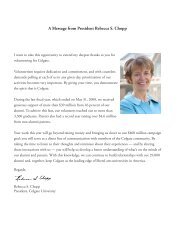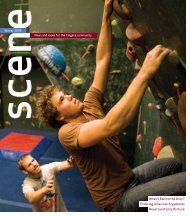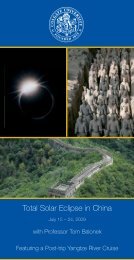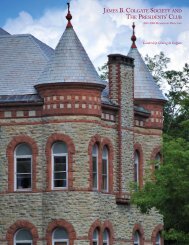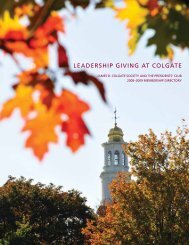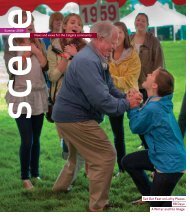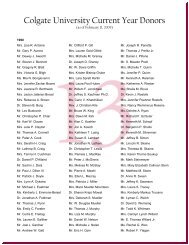101 Things To Do Before You Graduate Living In History ... - Alumni
101 Things To Do Before You Graduate Living In History ... - Alumni
101 Things To Do Before You Graduate Living In History ... - Alumni
You also want an ePaper? Increase the reach of your titles
YUMPU automatically turns print PDFs into web optimized ePapers that Google loves.
Message from Marilyn Thie, Core Revision Committee Chair<br />
When asked about their most meaningful academic<br />
experiences, many Colgate alumni are quick to bring up the core curriculum. Core courses, they say, gave<br />
them new ways of looking at the world, fuller perspectives on problems and issues, reasoning abilities they<br />
use every day, and, sometimes, an unexpected interest in a new subject of study.<br />
And they often report that things they learned in the core show up in<br />
their personal and professional lives in intriguing ways. Some identify a<br />
particular text, such as Plato’s Apology or a new interpretation of Genesis;<br />
another says their career in an Asian city was inspired by a Core Japan<br />
course and study group; yet another credits a Scientific Perspectives<br />
course with helping them sort through priorities in health care.<br />
When they arrive on campus, the Class of 2014 will be the first to take<br />
Colgate’s newly revised core curriculum. Many of the core’s goals remain<br />
the same — virtually unique among undergraduate general education<br />
programs, the core remains interdisciplinary and still represents what<br />
we believe all students should study. <strong>In</strong> this revision, our committee of<br />
faculty members from across the university considered the question,<br />
what should be the heart of a liberal arts education today? We asked<br />
ourselves, what is different about the world now, compared to when we<br />
designed the current core program in the mid-1990s? How have students,<br />
and teaching, changed? What will our students need to know, to have<br />
thought about, and to be conscious of, so that they can live responsibly<br />
and well in today’s complex, interdependent, and diverse world?<br />
Under the theme “Crossing boundaries,” we built on the known<br />
strengths of the four existing core components and continued<br />
expectations of critical reading, thinking, and writing. <strong>In</strong> addition, we<br />
encouraged greater commonality among courses in each component.<br />
Andrew Daddio<br />
Shining a spotlight on the reality of our globalizing world — for<br />
good and ill — is the major change. Two important implications follow<br />
from this new emphasis. The first is to break down the bifurcation<br />
between “the West and the rest of the world” inherent in the core’s<br />
structure. The second is the introduction of a fifth component called<br />
Global Engagements. The revised core embodies these two points in the<br />
following ways:<br />
• The original Western Traditions (Core 151) course has become<br />
“Legacies of the Ancient World.” This new focus recognizes that those<br />
who helped to shape Western culture, tradition, and thinking were not<br />
solely from the West. Acknowledging this allows for examination of<br />
the interactions among these groups; for example, the peoples who<br />
generated the Hebrew Bible were from the Middle East, and so, different<br />
from the ancient Greeks and Romans.<br />
• Challenges of Modernity (Core 152) now features six common<br />
texts and will include non-Western materials. The modernity course<br />
has always centered around the ideas, problems, and phenomena<br />
surrounding the intellectual, social, and material forces that have<br />
transformed life in the modern world. The increased commonality<br />
of readings and broadening of subject and time period will more<br />
effectively ensure that students learn to examine their own habits of<br />
mind, presuppositions, and prejudices within a global and historical<br />
perspective, as they practice real-world problem-solving skills.<br />
• The component Cultures of Africa, Asia, and the Americas, which<br />
offers a variety of courses about geographically defined areas, has<br />
become Communities and Identities. This broader framework, which<br />
is still largely internationally focused, can now also include courses<br />
that emphasize multi-ethnic complexities and tensions within diverse<br />
communities in Western Europe and North America. <strong>In</strong> effect, this more<br />
inclusive framework ends the outdated approach of framing “non-<br />
Western” cultures in the context of “others.”<br />
• Changes to the Scientific Perspectives on the World (SP) component<br />
were essentially in instructional planning and organization. Each<br />
interdisciplinary SP course focuses on a specific, compelling area of<br />
scientific research to deepen students’ understanding both of how we<br />
use the scientific method to acquire knowledge about the world and how<br />
to apply it to a broad range of issues inside and outside of science.<br />
• Global Engagements, the new fifth component, will consist of<br />
departmental and interdisciplinary program courses, as well as new<br />
courses. Most students will complete this requirement after the first four<br />
components through a course in their major or minor.<br />
Thanks to this refined version of our longstanding model of<br />
liberal arts education, our future graduates will have an even sounder<br />
foundation for the global reality they will live within.<br />
8<br />
Core conversation<br />
What was the most important thing you learned in the core? Go to<br />
www.colgatealumni.org/corecurriculum and post your thoughts.<br />
News and views for the Colgate community<br />
3



